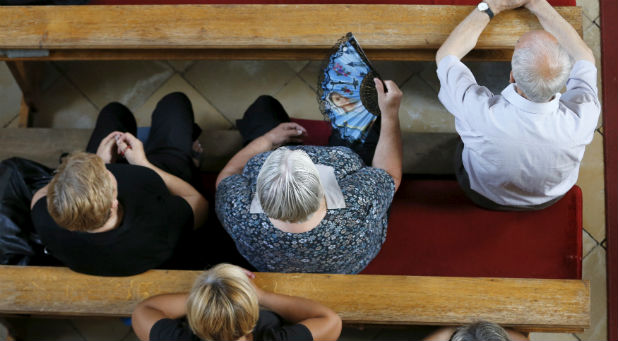Hate crimes and violence against Muslims are on the rise in the United States and Europe. Statistics from researchers at California State University revealed that since the start of 2015, hate crimes against American Muslims spiked by 78 percent — the highest rates since 2011.
Police in Manchester stated that violence and hate crimes against Muslims rose fivefold in the wake of the recent concert terror attack, but there’s been a surge in London as well. Recently even, a man rammed a van into a group of pedestrians outside a London mosque. One person was killed, and ten were wounded.
What’s at Stake?
Christians in the United States are particularly concerned with the persecution of minority Christians in other countries—and rightly so, as a report by Rupert Shortt shows that “Christians are targeted more than any other body of believers.” Because of this, believers are moved and encouraged when they see vulnerable Christian brothers and sisters protected by local Muslims, such as the recent terror attacks in the southern Philippines and the efforts by local Muslims to help Christians escape.
But when Muslims are attacked and threatened, when their freedom of religion is in jeopardy as minorities on our home turf, what would make them feel safe? How should Christians respond? What holds devout Christians back from taking the proper action to protect religious minorities in our own countries?
Emily Fuentes with Open Doors USA, a Christian organization that supports persecuted believers around the world, speculates, “Some Christians might feel a little uneasy about that, like, ‘OK, is that promoting Islam? Is that saying Islam is OK?’ And it’s not. It’s saying that God has allowed us to have the freedom to choose Him and to follow Him. We have a choice to have a relationship with God, and so the freedom to do that is vital and to be able to allow that for all people so all can come to Him.
But we can’t impede anything on them and … we want to make sure they’re protected in these societies to have religious freedom. There shouldn’t be violence against anyone, no matter what they believe.”
When we as Christians don’t take a stand and advocate for the protection of Muslims and other minority religions as well, it’s not our commitment to our own faith that is at stake. What’s at stake is our faithful witness before an unbelieving and lost world.
“We are calling for [religious freedom] in these nations where Christians are persecuted. If we’re calling for that, we need to ensure that the same thing is happening over here, or else we won’t be taken seriously in other countries but also just because it’s the right thing to do,” says Fuentes.
Protecting and reaching out to Muslim communities may not only help elevate religious freedom for all—it could also have an eternal impact and lead Muslims to Christ as they meet believers faithfully pursuing the God of the Bible.
Playing into the Hands of Terrorists
There’s even the cycle to consider that, when people lash out with attacks against Muslim minorities, it’s often following an attack by Muslim extremist groups. But responding to terrorist violence with acts of violence against moderate Muslims is exactly what these terror groups want as well.
“People are distraught by what’s happening with ISIS, and they take it out on those who aren’t even affiliated with ISIS … When this happens, ISIS is winning, right? It means that there’s a potential, [if] someone has had their family killed by an Islamophobic person, you know, the hatred or resentment grows. Not to say that everyone that this happens to would turn this way, but they’re more susceptible, and if they see that everyone around them hates them, they grow more and more susceptible to hearing from those [extremists] who say, ‘They hate you, come join us.'”
This is especially why, Fuentes says, “it’s vital to find ways to just show up and commune with your Muslim neighbors and let them know that Christians are there for them, and then soon there’s going to be opportunities for more talks and more relationships, and it’ll be amazing to see what God does in some of those situations.”
Taking a Cue from Fellow Christians
Christian communities around the world have already been stepping up to advocate for hurt Muslim communities, to protect those vulnerable and to condemn acts of violence against them. Here are just a few examples:
- In January, after a mosque was burned down in Victoria, Texas, four local churches and a synagogue offered their spaces for the Muslim congregation to gather, and local Catholic children visited the mosque and gifted the Muslim community with a tree.
- Hundreds of students at the University of Michigan, including several Christians and Jews, gathered to protect a group of Muslim students holding a public prayer after a Muslim student was threatened for wearing a hijab last year.
- In 2015, Christian, Jewish and Muslim religious leaders gathered along with the U.S. ambassador-at-large for international religious freedom for a public two-mile walk through Washington, D.C. to promote unity and condemn extremism.
- After a massive outbreak of violence against minority Muslims in Sri Lanka that injured 80 people and killed three on June 15, 2014, the National Christian Evangelical Alliance of Sri Lanka publicly condemned the attack.
- The National Council of Churches in the U.S. spoke out against retaliation violence on Muslims following the terror attack at the Charlie Hebdo satirical newspaper in Paris.
- In 2011 during the protests in Cairo, Egypt, Christians formed a protective human chain around Muslim protesters holding public prayer.
- Amidst terror attack threats in West Africa last year, Christians and Muslims in Cameroon came together to protect one another during their respective religious services.
- Catholic Christians in the Central African Republic sheltered Muslims who were vulnerable to attack by the anti-Balaka in 2014.
- Skye Jethani, a prominent Christian speaker and author of books such as The Divine Commodity: Discovering a Faith Beyond Consumer Christianity, has written about the importance of Christians defending religious freedom for Muslims.
Some Practical Steps
One way you can show support to your Muslims neighbors is just to reach out to a local Muslim community or nearby mosque to ask what their needs are and how you can help. And if you see or hear someone threatening Muslims and their religious freedom, say something.
You can also engage in community events where you can meet your Muslim neighbors and strike up conversations.
Fuentes shares one of her personal experiences engaging with a local Muslim community.
“I live in Anaheim, California, and we have a section of town here called Little Arabia. For the past 10-15 years, it’s been a huge immigrant population collectively from Lebanon, Egypt [and] Jordan, so it’s a settlement and lots of Arabic restaurants and Muslims, of course, as a result. Right now Ramadan is going on, and iftar is the feast that Muslims do to break [fasting] at sunset. So tonight they’re holding a special iftar event for refugees and just for the community to come break bread with them and just commune with them.
“For me on a personal level, it’s important whenever there’s an opportunity to jump into a community relationship like that, to join and just to be present, to say, ‘Hey, this is a Christian who wants to show you the love of Christ.’ It may not even have to be overt, like ‘road to Romans’ kind of evangelism, but it could be just simply showing up and saying, ‘Hey, here’s a Christian neighbor who loves you, who wants to have a relationship with you’ … Be the light of Christ. Be ready and open for these conversations with them.”
Finally, you can love Muslims by praying for them. Pray that they would be touched by acts of kindness of hospitality from the Church that would stir a curiosity to learn more about the God of the Bible. Ask God to open the eyes and hearts of Muslims to redemption and grace through Jesus as Savior, and even pray that God would use you in relationship with Muslims to lead them to Christ.
As Fuentes says, “Those kinds of relationships don’t happen if we don’t show up.” {eoa}
This article originally appeared on Mission Network News.
See an error in this article?
To contact us or to submit an article






















